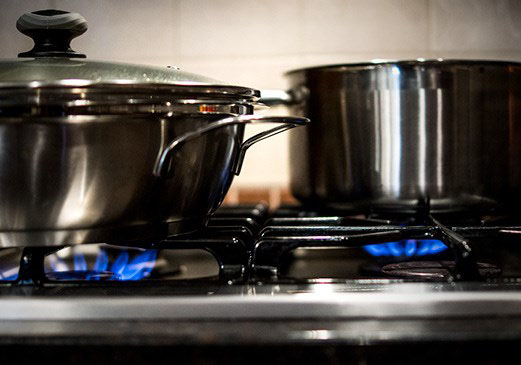Can you use a propane stove indoors?
When it’s time to upgrade your stove and cooktop, there’s no better choice than a propane-ready range. It’s powerful enough to handle even the toughest culinary demands, while providing energy-efficient fuel for all your kitchen needs.
A top choice for professional chefs
In fact, it's among the top choices for professional chefs and “foodies” across the country. They rely on the open flame of propane to provide the temperature control, consistent heating temperature, and instant heat they need to prepare mouthwatering dishes.
Over the years, consumers have turned to electric stoves and cooktops, but many have found the cooking surface temperature uneven and hard to control. You may wonder if you can use a propane stove indoors. With a few simple precautions, a propane stove will provide a lifetime of precision cooking with little trouble.
Is it safe to use a propane stove indoors?
Yes, it is safe to use a propane stove indoors. However, there are a few safety precautions to take if you have an indoor propane stove.

1. Adequate Ventilation
Like any cooking appliance, the key element in successfully using a propane stove is ventilation. Any stove that relies on an open flame releases exhaust into the indoor air. Installing an overhead range hood is the most consistent way to ensure adequate ventilation. By pulling exhaust from above the range and pulling in fresh air, this will ensure you have a steady stream of clean air while removing any fumes released from burning gas.
A range hood is always a good idea - even on electric cooktops - because it can remove unwanted smoke and odors created during the cooking process.
2. Open a Window
If you don’t have space for a range hood, simply ensure that you open a window in the cooking area. This will keep fresh air moving inside your home, and will allow exhaust fumes to be diluted and circulated with outdoor air.
3. Look for Wear or Damage
Aside from adequate ventilation, a visual safety check of your appliance is a best practice when working with any gas, such as propane. Look through all the primary components, such as the valves and controls, hose connections, and stovetop burners and fuel ports. If signs of wear or damage are present, take steps to address them - such as contacting your local Ferrellgas dealer for additional guidance or to speak with a service technician.
4. Have a Professional Check Your Stove Annually
It’s also a good idea to have your propane-powered appliance checked by a professional at least once a year, as well as perform regular inspections for potential gas leaks. Though uncommon, it’s best to catch a potential leak before it begins. Along those lines, it’s always a good idea to have a carbon monoxide detector and a propane gas detector installed inside your home. These simple preventative measures can give you the peace of mind to fully enjoy your propane appliance and put to rest any question of “is it safe to use a propane stove indoors?”
Benefits of Propane Stoves
Many people have found the advantages of propane to be worth the effort needed to convert:
- Propane is a clean and environmentally friendly fuel that “burns clean” to release relatively few pollutants into the atmosphere.
- Unlike natural gas, since it’s stored on-site in a pressurized tank the user has the ability to shut off the flow of gas if there’s a leak.
- Because propane is a high-octane, efficient fuel, you’ll get your dishes up to temperature faster - and deal with less maintenance caused by carbon build-up caused by unburned or partially burned fuel.
How to convert a natural gas or electric stove to propane
If you’re currently using a gas stove and are considering converting you’re not alone. Hardware stores generally sell conversion kits for indoor appliances, such as stoves and water heaters, however, other concerns must be taken into consideration when switching to propane.
To convert these appliances to propane:
- Check manufacturer’s instructions to ensure compatibility.
- Consider consulting with a trained professional before conversion.
- Disconnect the stove from the original gas line.
- Remove the stove burners and fittings.
- Attach new burners designed for propane.
- Adjust the burner settings to the desired flame.
It's always a good idea to visit with a trained service professional as the conversion can require changing out valves, switches, and some safety devices. If you’re attempting the conversion yourself, take the extra step to contact a Ferrellgas location near you and schedule a visit to review the work. It will help ensure that you can fire up your range without any worry or concern.
Conversion kits & professional installation
Few appliances are more central to a family’s life than the stove and cooktop. From simple family dinners to elaborate holiday celebrations, the most meaningful moments of our lives often begin with the food we prepare and share with the people we love. By following a few safety measures to get the most from your high-efficiency propane stove and range, you’ll be able to keep those delicious memories cooking for years to come.
CATEGORIES
Archives
- Fall 2024
- Summer 2024
- Spring 2024
- Winter 2023
- Fall 2023
- Summer 2023
- Spring 2023
- Winter 2022
- Fall 2022
- Summer 2022
- Spring 2022
- Winter 2021
- Fall 2021
- Summer 2021
- Spring 2021
- Winter 2020
- Fall 2020
- Summer 2020
- Spring 2020
- Winter 2019
- Fall 2019
- Summer 2019
- Spring 2019
- Winter 2018
- Fall 2018
- Summer 2018
- Spring 2018
- Winter 2017
